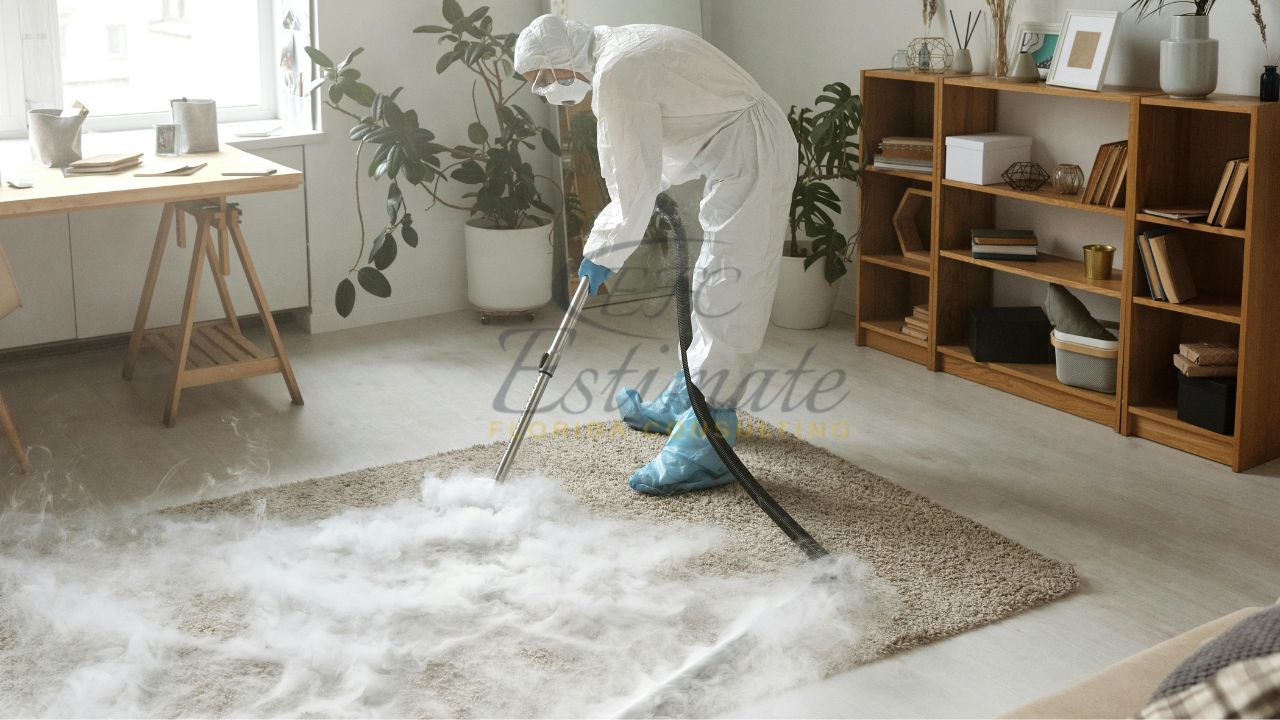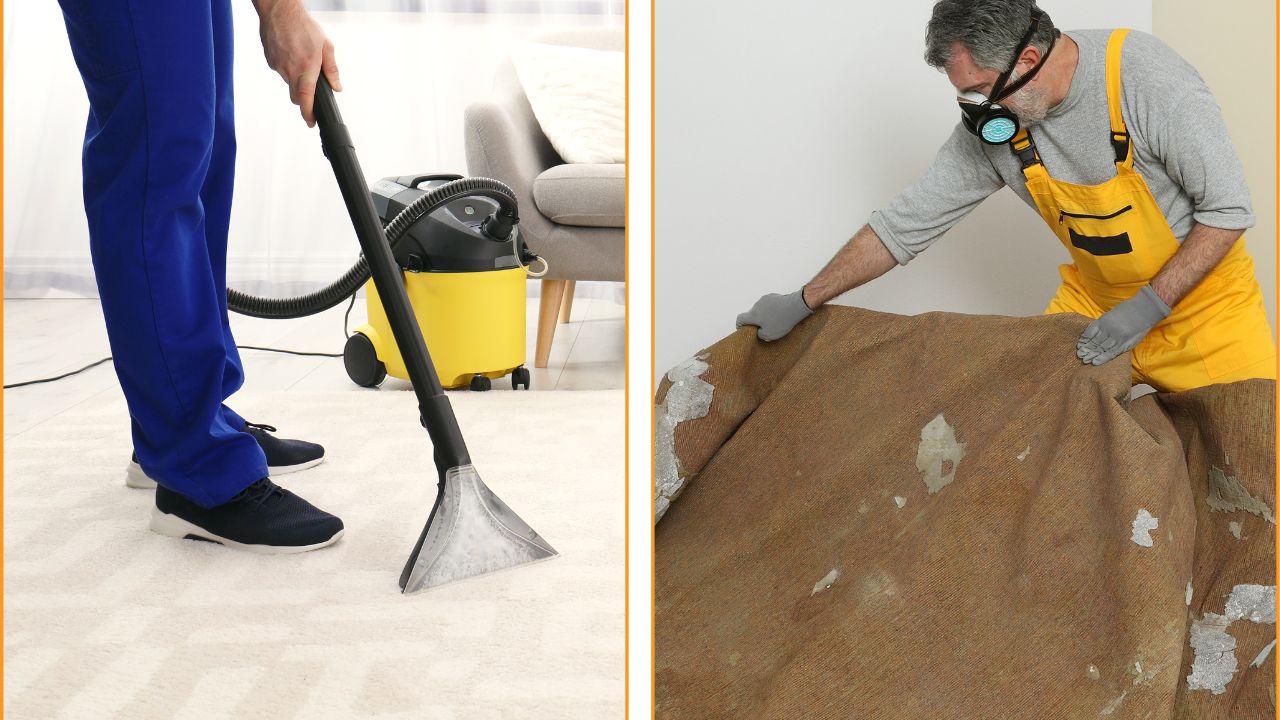Carpet Cleaning vs Replacement: Which is More Cost-Effective?
In the U.S., the average homeowner spends between $123 and $241 on professional carpet cleaning and roughly $1,780 on carpet replacement. This cost difference raises a clear question: when does it make financial sense to clean your carpet, and when is replacement the better option? This blog compares the direct costs, long-term value, and decision factors behind each option.
Carpet Cleaning Costs
A typical carpet cleaning service charges around $182 per home, but this varies based on method and room size. Companies often charge $25 to $75 per room, though premium services can go higher. Pricing by square foot ranges from $0.20 to $0.98.

Common Methods and Costs
Method | Cost Per Room | Key Benefit | Drawback |
Steam Cleaning | $30 to $50 | Deep cleaning and allergen removal | Takes 6 to 24 hours to dry |
Dry Cleaning | $25 to $75 | Fast drying | Less effective on deep stains |
Shampooing | $30 to $55 | Effective on heavy soiling | May leave residue |
Extra charges include:
- Pet stains/odors: $20 to $50 per treatment
- Heavy soiling: $20 to $40 per room
- Furniture moving: $20 to $500
- Stain guard: $10 to $40 per room
Many companies enforce a minimum service fee of $100 to $150, which can affect value for small jobs.
All pricing is based on market research.
Carpet Replacement Costs
Replacing carpet averages $1,780 for a standard 330-square-foot room. Costs depend on material, labor, and extras like padding and removal.
Breakdown of Carpet Replacement Costs
Item | Cost Per Sq Ft | Total for 200 Sq Ft |
Polyester Carpet | $1 to $3 | $200 to $600 |
Nylon Carpet | $2 to $5 | $400 to $1,000 |
Wool Carpet | $4 to $20 | $800 to $4,000 |
Padding | $0.75 to $2.00 | $150 to $400 |
Labor | $0.50 to $1.00 | $100 to $200 |
Old Carpet Removal | $1.00 to $5.00 | $200 to $1,000 |
Subfloor Repairs | $1.50 to $10.00 | $300 to $2,000 |
Total cost varies depending on materials and whether you handle demolition. A mid-range replacement with nylon and standard labor can exceed $2,000.
All pricing is based on market research.
Carpet Cleaning vs Replacement
Use cleaning if the carpet is under 10 years old and shows signs of dirt or surface stains. Cleaning works well when the structure is intact, and problems are limited to the surface.
Replace the carpet if you notice:
- Musty odors that remain after cleaning
- Irreversible stains (e.g., bleach or wine)
- Matting, fraying, or tears
- Uneven or unsupportive padding
- Allergy symptoms triggered by the carpet
In these situations, cleaning will not restore the carpet or solve the underlying issues.
Should You Go for Carpet Cleaning or Replacement?
The average carpet lasts 5 to 15 years. Longevity depends on material, foot traffic, and maintenance. Polyester has a lifespan of 5 to 10 years. Nylon and wool can last 15 to 20 years with proper care.
According to the Carpet and Rug Institute, regular and proper cleaning is essential for preserving carpet appearance and performance over time.
Use this guide to decide if you need a new carpet or just clean it:
- Clean if the issue is dirt buildup or mild staining
- Replace if the carpet has structural damage, old padding, or age-related deterioration
When Professional Carpet Cleaning Is the Right Choice?
Hiring a team for professional carpet cleaning is cost-effective when you’re dealing with manageable dirt, odors, and routine wear. It’s particularly useful for carpets that haven’t reached the end of their lifespan but have become dull or stained from daily use. Cleaning is also beneficial in homes with pets, children, or allergy concerns, as it helps remove allergens and contaminants that vacuuming can’t reach.
Routine cleanings every 12 to 18 months can help preserve the structure and appearance of the carpet. For homeowners aiming to postpone the expense of replacement, cleaning acts as a maintenance tool that supports long-term durability. When timed right, it provides both immediate visual improvement and extended carpet life without the financial burden of new flooring.

Environmental Impact
Cleaning has a lower environmental footprint. It uses water and solutions but avoids manufacturing and disposal waste. Carpet manufacturing consumes energy and water, and synthetic carpets can take centuries to decompose in landfills.
If you must replace, use recycling services like the Carpet America Recovery Effort (CARE) to keep old carpet out of landfills.
Budget Planning
Before replacing carpet, it helps to plan ahead using a carpet installation cost calculator. This allows you to account for all variables, from materials to subfloor repairs.
Cost estimates vary by region and labor availability. It’s also important to get quotes from multiple contractors and verify what’s included in their rates.
If you must replace, use recycling services like the Carpet America Recovery Effort (CARE) to keep old carpet out of landfills.
Estimate Flooring Work Before Deciding
When you’re undecided between carpet restoration and replacement, get a quote to estimate flooring work. This will show how much you’d spend on a full replacement versus a deep cleaning, helping you avoid unnecessary costs.
This is especially helpful if you’re unsure about the condition of the subfloor, as hidden damage can significantly raise replacement costs.
Frequently Asked Question
Every 12 to 18 months, especially if you have pets or children. More frequent cleaning may be needed for high-traffic areas.
If the carpet is over 10 years old and has structural damage or permanent stains, replacement is more practical.
Wool and nylon offer the longest lifespan. Polyester is more affordable but wears out faster.
Yes. Regular cleaning is key to maintaining the look and performance of carpet over time.
Final Thoughts
Cleaning costs much less than replacement and can extend your carpet’s life by years if done regularly. Replacement is necessary when there are structural issues, odor saturation, or significant damage.
To explore more tools and insights that can help with home upgrades, visit Estimate Florida Consulting.

